- Home
- Josephine Tey
Brat Farrar Page 9
Brat Farrar Read online
Page 9
As Eleanor swept round towards the house, Brat saw Beatrice Ashby come out on to the doorstep, and a sudden panic seized him; a mad desire to blurt out the truth to her and back out there and then; before he had put foot over the doorstep; before he was definitely «on» in the scene. It was going to be a damnably difficult and awkward scene and he had no idea how to play it.
It was Ruth who saved him from the worst moment of awkwardness. Before the car had come to a halt she was piping her triumph to the world, so that Brat's arrival somehow took second place to her own achievement.
"I met him after all, Aunt Bee! I met him after all. I came up from the gate with them. You don't mind, do you? I just strolled down as far as the gate and when I got there I saw them coming, and they stopped and gave me a lift and here we are and so I met him after all."
She linked her arm through Brat's and tumbled with him out of the car, dragging him behind her as if he were a find of her own. So that it was with a mutual shrug for this display of personality that Brat and Bee greeted each other. They were united for the moment in a rueful amusement, and by the time the amusement had passed so had the moment.
Before awkwardness could come flooding back, there was a second distraction. Jane came riding round the corner of the house on Fourposter on her way to the stables. The instant check of her hands on the reins when she saw the group at the door made it obvious that she had not planned on being one of that group. But it was too late now to back out, even if backing out had been possible. It was never possible to back away from anything that Fourposter might happen to be interested in; he had no mouth and an insatiable curiosity. So forward came the reluctant Jane on a highly interested pony. As Fourposter came to a halt she slid politely to the ground and stood there shy and defensive. When Bee introduced her she laid a small limp hand in Brat's and after a moment withdrew it.
"What is your pony's name?" Brat asked, aware of her antagonism.
"That's Fourposter," Ruth said, appropriating Jane's mount. "The Rector calls him the Equine Omnibus."
Brat put out his hand to the pony, who refused the advance by withdrawing a pace and looking contemptuously down his Roman nose. As a gesture it was pure burlesque; a Victorian gesture of repudiation from a Victorian drama.
"A comedian," remarked Brat; and Bee, delighted with his perception, laughed.
"He doesn't like people," Jane said, half-repressive, half-defending her friend.
But Brat kept his hand out, and presently Fourposter's curiosity overcame his stand-offishness and he dropped his head to the waiting hand. Brat made much of him, till Fourposter capitulated entirely and nuzzled him with elephantine playfulness.
"Well!" said Ruth, watching. "He never does that to anyone!"
Brat looked down into the small tight face by his elbow, at the small grubby hands clutching the reins so tightly.
"I expect he does to Jane when no one is around," he said.
"Jane, it is time you were cleaned up for lunch," Bee said, and turned to lead the way indoors.
And Brat followed her, over the threshold.
12
"I have put you in the old night nursery," Bee said. "I hope you don't mind. Simon has the room that he used to share with-that you used to share with him." Oh, dear, what a gaffe, she thought; shall I ever be able to think of him as Patrick? "And to give you one of the spare rooms was to treat you like a visitor."
Brat said that he would be glad to have the night nursery.
"Will you go up now, or will you have a drink first?"
"I'll go up now," Brat said, and turned to the stairway.
He knew that she had been waiting for this moment; waiting for the moment when he must show knowledge of the house. So he turned from her and led the way upstairs; up to the big first landing and down the narrow corridor to the north wing, and to the children's rooms facing west from it. He opened the third of the four doors and stood in the room that Nora Ashby had arranged for her children when they were small. One window looked west over the paddocks and the other north to the rise of the down. It was on the quiet side of the house, away from the stables and the approach from the road. He stood at the window looking at the soft blue English distances, thinking of the brilliant mountains beyond the whirling dust of the West, and very conscious of Bee Ashby behind him.
There was something else that he must take the initiative about.
"Where is Simon?" he said, and turned to face her.
"He is like Jane," she said. "Late for lunch. But he'll be in at any moment."
It was smoothly done, but he had seen her shy at his unheralded question, as if he had flicked a whip. Simon had not come to meet him; Simon had not been at Latchetts to greet him; Simon, it was to be deduced, was being difficult.
Before he could pursue the subject she took the initiative from him.
"You can have the nursery bathroom all to yourself, but do go slow on the hot water, will you? Fuel is a dreadful problem. Now wash and come down at once. The Pecks sent over some of the Rectory sherry."
"Aren't they coming to lunch?"
"No, they're coming to dinner to-night. Lunch is for family only."
She watched him turn to the fourth door, which he knew to be the bathroom of the nursery wing, and went away looking comforted. He knew why she was comforted: because he had known his way about the house. And he felt guilty and ill at ease. Fooling Mr. Sandal-with a K.C. sitting opposite you and gimletting holes in you with cynical Irish eyes-had been one thing; fooling Mr. Sandal had been fun. But fooling Bee Ashby was another thing altogether.
He washed absentmindedly, turning the soap in his hands with his eyes on the line of the down. There was the turf he had wanted to ride on; the turf he had sold his soul for. Presently he would get a horse and go up there and ride in the quiet, away from human relationships and this fantastic game of human poker, and up there it would once more seem right and worth while.
He went back to his room and found a brassy blonde in tight flowered rayon tweaking the wallflower in the bowl on the window-sill.
"Hullo," said the blonde. "Welcome home, and all that."
"Thanks," Brat said. Was this someone that he should know? Surely not!
"You're very like your brother, aren't you?"
"I suppose so." He took his brushes from his «grip» and put them on the dressing-table; it was a symbolical taking-possession.
"You won't know me, of course. I'm Lana Adams from the village. Adams the joiner was my father. I oblige because my boy-friend works in the stables."
So that is what she was: the help. He looked at her and was sorry for the boy-friend.
"You look a lot older than your brother, don't you? I suppose it's knocking about the world that does it. Having to look out for yourself, and all that. Not being spoilt like your brother. You'll excuse me saying it but spoilt he is. That's why he's made all this to-do about you coming back. Silly, I call it. You've only to look at you to know that you're an Ashby. Not much point in saying you're not, I should think. But you take my tip and stand up to him. He can't stand being stood up to. Been humoured all his life, I should say. Don't let it get you down."
As Brat went silently on with his unpacking, she paused; and before she could resume Eleanor's cool voice said from the doorway:
"Have you everything you want?"
The blonde said hastily: "I was just welcoming Mr. Patrick back," and, having flung Brat a radiant smile, made a hip-swing exit from the room.
Brat wondered how much Eleanor had heard.
"It's a nice room this," Eleanor said, "except that it doesn't get the morning sun. That bed is from Clare Park. Aunt Bee sold the little ones and bought that one at the Clare sale. It's nice, isn't it? It was the one in Alec Ledingham's room. Except for that the room is just the same."
"Yes; the old wallpaper, I notice."
"Robinson Crusoe and company. Yes. I had a great weakness for Hereward the Wake. He had such an enchanting profile." She pointed to Hereward'
s place in the pattern of fictional heroes that Nora had chosen for her children's nightly entertainment.
"Is the nursery-rhyme paper still next door?"
"Yes, of course. Come and see."
He went with her, but while she rehearsed the pictured tales his mind was busy with the village girl's revelation about Simon and with the ironic fact that he was to sleep in Alec Loding's bed.
So Simon had refused to believe that he was Patrick. "Not much point in saying you're not, I should think." That could only mean that Simon, in the face of all the evidence, refused to accept him.
Why?
He followed Eleanor downstairs, still wondering.
Eleanor led him into a big sunny sitting-room where Bee was pouring sherry, and Ruth was picking out a tune on a piano.
"Would you like to hear me play?" Ruth asked, inevitably.
"No," Eleanor said, "he wouldn't. We've been looking at the old wallpapers," she said to Bee. "I'd forgotten how in love with Hereward I used to be. It's just as well that I was removed from him in time or he might have become a fixation or something."
"I never liked that baby stuff on the walls," Ruth said.
"You never read, so you couldn't know anything about them," Eleanor said.
"We gave up using the nursery wing when the twins ceased to have a Nanny," Bee said. "It was too far away from the rest of the house."
"It was a day's march to call the twins in the morning," Eleanor said, "and as Ruth always needed calling several times we had to move them into the normal family orbit."
"Delicate people need more sleep," Ruth said.
"Since when have you been delicate?" asked Eleanor.
"It's not that I'm delicate but that Jane's more robust, aren't you, Jane?" she said, appealing to Jane, who sidled into the room, the hair at her temples still damp from her hasty ablutions.
But Jane's eyes were on Bee.
"Simon is here," she said in a small voice; and crossed the room to stand near Bee as if for reassurance.
There was an instant of complete silence. In the moment of suspended animation only Ruth moved. Ruth sat up and sparkled with anticipation.
Then Bee's hand moved again and went on filling the glasses. "That is very nice," she said. "We needn't keep luncheon back after all."
It was so beautifully done that Brat, knowing what he knew now, felt like applauding.
"Where is Simon?" Eleanor asked casually.
"He was coming downstairs," Jane said; and her eyes went back to Bee.
The door opened and Simon Ashby came in.
He paused a moment, looking across at Brat, before closing the door behind him. "So you've come," he said.
There was no emphasis on the words; no apparent emotion in the tone.
He walked slowly across the room until he was standing face to face with Brat by the window. He had abnormally clear grey eyes with a darker rim to the iris, but they had no expression in them. Nor had his pale features any expression. He was so tightly strung, Brat thought, that if you plucked him with a finger he would twang.
And then quite suddenly the tightness went.
He stood for a moment searching Brat's face; and his own was suddenly slack with relief.
"They won't have told you?" he said, drawling a little, "but I was prepared to deny with my last breath that you were Patrick. Now that I've seen you I take all that back. Of course you are Patrick." He put out his hand. "Welcome home."
The stillness behind them broke in a flurry of movement and competing voices. There was a babble of mutual congratulation, of chinking glasses and laughter. Even Ruth, it seemed, stifled her disappointment at being done out of melodrama, and devoted her talents to wheedling a little more sherry into her glass than the «sip» that was the twins' allowance for health-drinking.
But Brat, drinking the golden liquid and thanking heaven that the moment was over, was puzzled. Why relief? he was thinking.
What had Ashby expected? What had he been afraid of?
He had denied the possibility of Brat's being Patrick. Had that been just a defence against hope; an insurance against ultimate disappointment? Had he said to himself: I won't believe that Patrick is alive, and so when it is proved that he isn't I won't have hoped for nothing? And was that overwhelming relief a moment ago due merely to the realisation that he was after all Patrick?
It didn't fit.
He watched Simon being the life of the party, and wondered about him. A few moments ago Ashby had been steeled to face something, and now it seemed he had been-let off. That was it. That was what that sudden relief had been. The reaction of someone steeled to face the worst and suddenly reprieved.
Why should he feel reprieved?
He took the small puzzle into luncheon with him, and it lay at the back of his mind while he dealt with the problems of Ashby conversation and answered their crowding questions.
"You're in!" gloated the voice inside him. "You're in! You're sitting as of right at the Ashby table, and they're all tickled to death about it."
Well, perhaps not all. Jane, loyal to Simon, was a small silent oasis in the right talk. And it was not to be expected that Simon himself, for all his capitulation, was tickled to any great extent. But Bee, entirely uncritical of that capitulation, was radiant: and Eleanor melted moment by moment from conversational politeness to a frank interest.
"But a Comanche bridle is a kind of twitch, isn't it?"
"No; just a gag. The rope goes through the mouth the way a bit does. It's best for a led horse. He'll follow to lessen the pull."
Ruth, having quite forgiven his lack of speculation about her looks, paid assiduous court to him; and she was the only one who called him Patrick.
This became more noticeable as the meal went on, and her continual interjection of "Patrick!" as she claimed his attention contrasted with the others' half-conscious avoidance of the name. Brat wished that his sole «follower» had proved to be Jane and not Ruth. If he had ever had a small sister he would have liked her to be just like Jane. It annoyed him that he had difficulty in meeting Jane's eyes. It cost him the same effort to meet her regard with equanimity as it did to meet the eyes of the portrait behind her. The dining-room was positively papered with portraits, and the one behind Jane was of William Ashby the Seventh, wearing the uniform of the Westover Fencibles, in which he had proposed to resist the invasion of Napoleon the First. Brat had learned those portraits off by heart, sitting under the pagoda in Kew Gardens, and every time he lifted his eyes to those of William Ashby the Seventh he was plagued by the ridiculous notion that William knew all about the pagoda.
One thing helped him enormously, however, in this first difficult meeting with the Ashbys. The tale he had to tell, as Loding had pointed out during that meal at the Green Man, was, except for its beginnings, true; it was the tale of his own life. And since the whole family with one accord avoided any reference to the events which had catapulted him into that life, the conversational ground he moved on was firm. There was need for neither side-stepping nor manoeuvre.
Nor was there any need for him to "mind his manners"; and for that too Alec Loding had given loud thanks. It seemed that, short of a first-class and very strict Nanny, there was no more rigorous training in the civilised consumption of food than was to be had at a first-class orphanage. "My God," Loding had said, "if I ever have any change from a round of drinks I'll send it to that caravanserai of yours, as a mark of my gratitude that you were not brought up in some genteel suburb. Gentility is practically ineradicable, my boy. And whatever Pat Ashby might conceivably do, it is quite inconceivable that he should ever stick out his little finger when he drank."
So Brat had no social habits to unlearn. Indeed, his orthodoxy slightly disappointed Ruth, always on the lookout for the flamboyant.
"You don't eat with your fork," she said; and when he looked puzzled, added: "The way they do in American pictures; they cut things up with their knives and forks and then they change the fork over to their other h
and and eat with it."
"I don't chew gum either," he pointed out.
"I wonder how that very elaborate method of dealing with their food arose," Bee said.
"Perhaps knives were scarce in the early days," Eleanor suggested.
"Knives were far too useful to be scarce in a pioneer society," Simon said. "It's much more likely that they lived so long on hash that when they got things in slices their instinct was to make hash of it as soon as possible."
Brat thought, listening to them, how very English it all was. Here he was, back from the dead, and they were calmly discussing American table manners. There was no backslapping, congratulatory insistence on the situation as there would be in a transatlantic household. They avoided the do-you-remember theme as determinedly as Americans would have wallowed in it. Remembering his friends of the Lazy Y, he thought what a fine exhibition of Limey snootiness this would be from the point of view of Pete, and Hank, and Lefty.
But perhaps the happiness on Bee's face would have impressed even Lefty.
"Do you smoke?" Bee asked, when she had poured the coffee; and she pushed the cigarette box over to him. But Brat, who liked his own brand, took out his case and offered the contents to her.
"I've given them up," Bee said. "I have a bank balance instead."
So Brat offered the case to Eleanor.
Eleanor paused with her fingers touching the cigarettes, and bent forward to read something engraved on the inside of the case.
"Brat Farrar," she said. "Who is that?"
"Me," said Brat.
"You? Oh, yes; Farrar, of course. But why Brat?"
"I don't know."
"Did they call you that? Brat, I mean?"
"Yes."
"Why Brat?"
"I don't know. Because I was small, I guess."

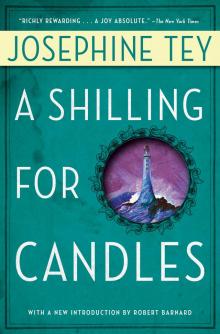 A Shilling for Candles
A Shilling for Candles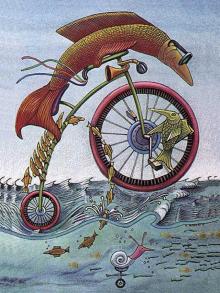 The Singing Sands
The Singing Sands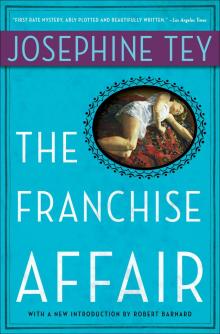 The Franchise Affair
The Franchise Affair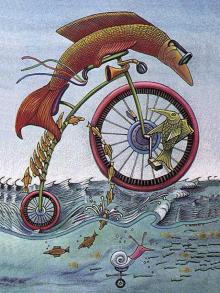 Daughter of Time
Daughter of Time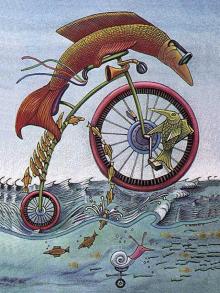 To Love and Be Wise
To Love and Be Wise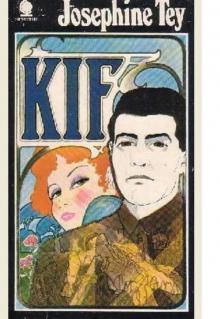 Kif
Kif The Expensive Halo: A Fable Without Moral
The Expensive Halo: A Fable Without Moral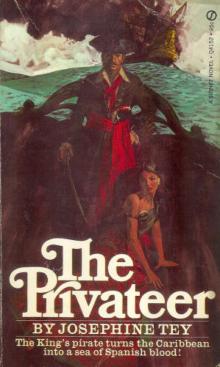 The Privateer
The Privateer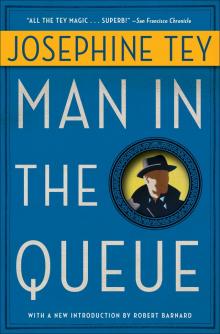 The Man in the Queue
The Man in the Queue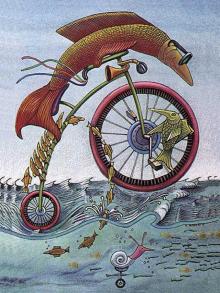 Miss Pym Disposes
Miss Pym Disposes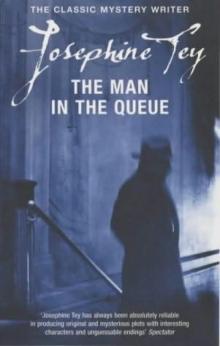 The Man in the Queue ag-1
The Man in the Queue ag-1 Brat Farrar
Brat Farrar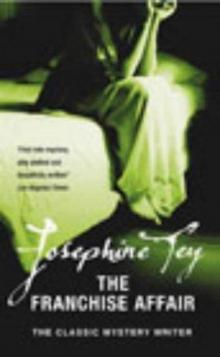 The Franchise Affair ag-3
The Franchise Affair ag-3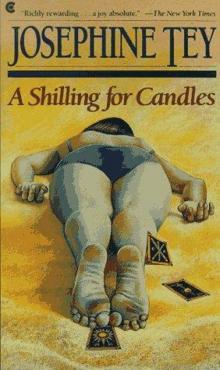 A Shilling for Candles ag-2
A Shilling for Candles ag-2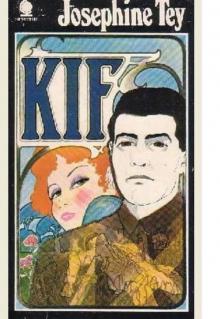 Kif: An Unvarnished History
Kif: An Unvarnished History The Expensive Halo
The Expensive Halo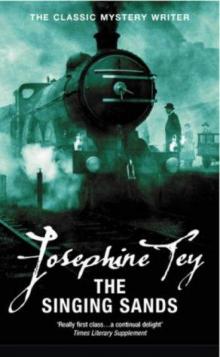 The Singing Sands ag-6
The Singing Sands ag-6 To Love and Be Wise ag-4
To Love and Be Wise ag-4